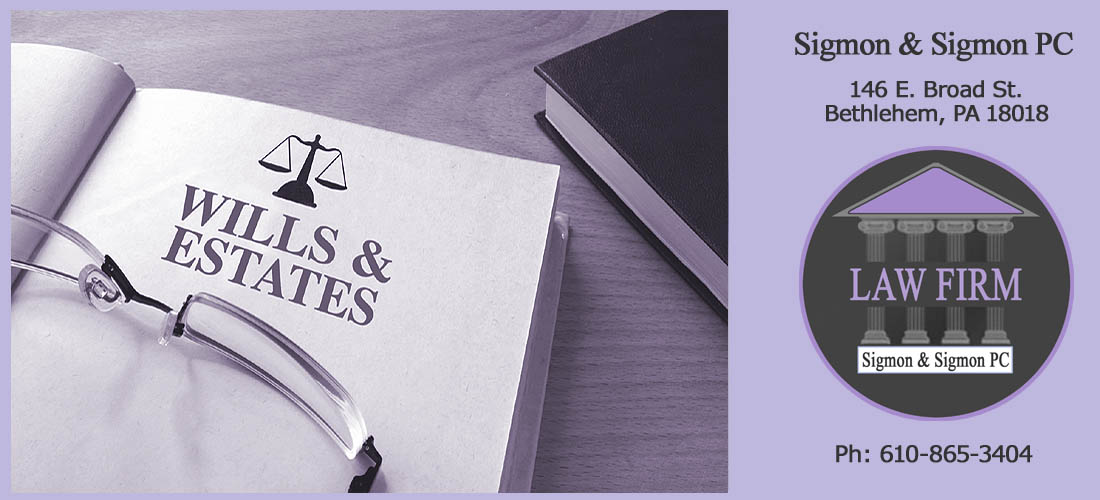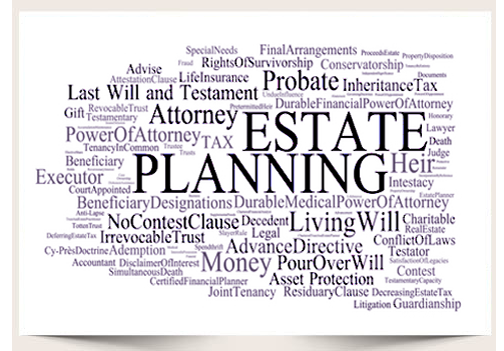

Don't get caught in the legal quagmire of estate planning - Sigmon & Sigmon, P.C. can h&le all of your legal needs after a loss so you can focus on family. Serving Allentown, Bethlehem, Easton, Stroudsburg & Lehigh Valley, PA & surrounding areas.
Your #1 responsibility is taking care of your family, so when it comes to preparing for the unexpected Sigmon & Sigmon, P.C. takes every measure to make sure your wills & estate planning are in order. With our long history of preparing wills & minimizing taxes through estate planning, you can be sure that your family will have everything they need to recover from their loss.
In Pennsylvania there are three important documents we feel everyone should have:
1.) Last Will & Testament, 2.) Advance Healthcare Declaration (Living Will), &
3.) Power
of Attorney (POA).




Wills & trusts are both estate planning tools that can help ensure your assets are protected & bequeathed to your heirs, besides your spouse, which is generally not an issue. This is because the unlimited marital deduction provision within the United States Estate & Gift Tax Law allows the passing of wealth to a surviving spouse without incurring gift or estate tax liabilities. However, the transfer process becomes much more involved when wealth is passed to a subsequent generation. It is possible to have both a will & a trust.
A will is a written document expressing a deceased person's wishes, from naming guardians of minor children to bequeathing objects & cash assets to friends, relatives, or charities. A will becomes active only after one's death. A trust is active the day you create it, & a grantor may list the distribution of assets before their death in it, unlike a will. There are irrevocable trusts, often created for tax purposes, which cannot be altered after their creation, & living trusts, which can be changed by the grantor.
All wills must go through a legal process called probate, where an authorized court administrator examines them. This process can be lengthy & potentially contentious if family members contest the will. Trusts are not required to go through probate when the grantor dies, & they cannot be contested.
Wills & trusts are both estate planning tools that can help ensure your assets are protected & bequeathed to your heirs, besides your spouse, which is generally not an issue. This is because the unlimited marital deduction provision within the United States Estate & Gift Tax Law allows the passing of wealth to a surviving spouse without incurring gift or estate tax liabilities.
A trust is another method of estate transfer—a fiduciary relationship in which you give another party authority to h&le your assets for the benefit of a third party, your beneficiaries.
A trust can be created for a variety of functions, & there are many types of trusts. Overall, however, there are two categories: living & testamentary. A will can be used to create a testamentary trust. You can also create a trust for the primary purpose of avoiding probate court, called a revocable living trust.
With a declaration of trust, your estate stays private & passes directly to your heirs, you do not pay a probate attorney or court costs, & your loved ones may be able to avoid being tied up in probate court for what could be a year or more.
While it might be an awkward or even painful topic to think about, mapping out what should happen to your assets if you die or become incapacitated is a crucial part of financial planning. If you can work your way through the main estate planning tasks now, you’ll set your loved ones up for an easy transition when you pass away.
What is estate planning? Estate planning involves developing a strategy to deal with your assets & investments after you die. It aims to provide peace of mind for you & your loved ones, ensuring that your assets are passed on to your beneficiaries in the most simple & effective way.
How do I start estate planning? The estate planning process can be broken down into a few simple steps: Take stock of your assets. Create a list of all your personal assets, as well as other assets that form your estate, such as trusts, stocks or life insurance. Identify risks. Identify any potential risks you want to plan around before & after your death, such as divorce, mental incapacity or your early death.
Create a plan. Work with your lawyer, accountant & or financial planner to work out an estate plan that is tailored to your needs & incorporates all your assets. For help developing a comprehensive estate plan that covers all necessary issues, it’s recommended that you seek independent legal advice. Your lawyer will be able to help you get started & provide expert advice tailored to your personal needs.
How to make a will. A will is a critical legal document that outlines your wishes for the distribution of your assets after your death. By creating a clear & unambiguous will you can: Ensure that your assets are distributed to the right people. Provide instructions on who will look after your children. Establish trusts to distribute assets among your beneficiaries more effectively. Provide instructions for your funeral home. If you die without a will or with an invalid will, this is known as dying intestate. When this happens, each state has its own laws regarding how your assets will be distributed. Though those assets will usually be distributed to your family members, this allocation may go against your final wishes. With this in mind, it’s essential that you create a will & update it regularly to reflect any changes to your legal rights.
Who’s involved after I die? When you create your will, you’ll be required to nominate your executor. The executor’s role is to carry out your wishes as specified in your will, & they have the power to administer the estate. Depending on your personal circumstances, others may also be involved. For example, if you establish a testamentary trust in your will, you will also appoint a trustee to administer that trust.